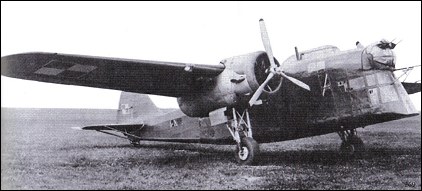|
| Built as a low-risk back-up to the advanced PZL P.37 Los, the LWS
Zubr (Bison) bomber had its origin in a design for an airliner that the
Polish national airline had rejected as too old-fashioned. Unlike the all-metal
Los, the Zubr was built of all sorts of materials. As production began,
engines were changed from 336kW (450hp) Twin Wasps to 507kW
(680hp) Bristol Pegasuses, which caused different stresses on the airframe.
Many weaknesses soon became apparent and cracks were dealt with by
fixing on wooden patches. Inevitably the prototype fell apart, unfortunately
while carrying prospective Romanian purchasers.
The 'improved' LWS.6 with the same engines and a twin tail weighed
more because of its extra strengthening - so much more that they were
unable to carry bombs. The Luftwaffe put the survivors into use as
unarmed trainers. FACTS AND FIGURES © The prototype LWS.6 had a
stronger twin-finned tail, but it
was heavier than the original
single-finned unit, which was
refitted to the production models. © The mixed construction of the
Zubr included partly metal
stressed skin, steel tube with fabri
covering, fabric-covered metal,
and just wood. © The undercarriage retraction
motors were not powerful enough
to raise the landing gear and the
gear units were eventually locked
in the down position. © The pilot's canopy was mounted
above the flat-topped fuselage
and offset to the left side. There
was a dorsal gun turret as well as
a twin turret above the bombaimer's
glazed nose.
 | A three-view drawing (800 x 271) |
| CREW | 4 |
| ENGINE | 2 x 680hp Bristol Pegasus VIII piston engines |
| WEIGHTS |
| Take-off weight | 6865 kg | 15135 lb |
| DIMENSIONS |
| Wingspan | 18.52 m | 61 ft 9 in |
| Length | 15.39 m | 51 ft 6 in |
| Height | 4.00 m | 13 ft 1 in |
| PERFORMANCE |
| Max. speed | 380 km/h | 236 mph |
| Alex, e-mail, 09.03.2021 20:40 it was a bad polish bomber reply | | Tom Griffith, e-mail, 31.08.2015 15:48 Given that all four of my mom's grandparents were born in Poland and emigrated to the US in the late 19th Century, I'm half-Polish. That being said, this aircraft DOES look like something cobbled together by the "Little Rascals." reply | | Klaatu83, e-mail, 21.07.2015 04:45 There is an old adage about airplanes that runs, "if it looks right it will usually fly right". This was one of the worst combat aircraft of it's day, and looks it. reply | | Pedro_Vial, e-mail, 12.12.2009 20:39 You've missed the LWS 3 Mewa, a very intersting recon and military transport aircraft. you can search it on youtube, there is a very good video about it.ç
Sorry for my english, its rusty reply | |
| | Sgt.KAR98, 19.02.2008 00:10 This plane looks more interesting than the PZL Los. reply | | William Luther Jr., e-mail, 04.10.2007 19:42 I have a photo of one wrecked in a Germam air raid in 1939 from a book on the Polish air force 1919-1945 called "White Eagles" and it looks like something children would build out of scrap or something from the old "Little Rascals" serials! reply | | Milo, e-mail, 25.09.2007 15:43 Correct spellings of polish names are "¯ubr" ("¿" should be pronounciated just like french "j") and "£o¶" - "Elk" or "Moose" ("³" - like "w" in the word "world", and "¶" - softened "sh" like in japanese "sushi" but contracted, without "i" at the end). reply | | mort_faucheur, 19.08.2007 03:13 'Bison', a very apt nickname for this plane. It looks almost as hideous as the French heavy bombers of the 1930s. reply | | Crazy_Ivan, e-mail, 21.07.2007 22:04 As has been written, Zubr was a back-up for Los. But in fact there were more of them on polish airports. Unfortunately most of them were destroyed by German bombers in first days of war. The surviving machines was unarmed an in this way useless. reply |
|
Do you have any comments?
|
| 
All the World's Rotorcraft |






